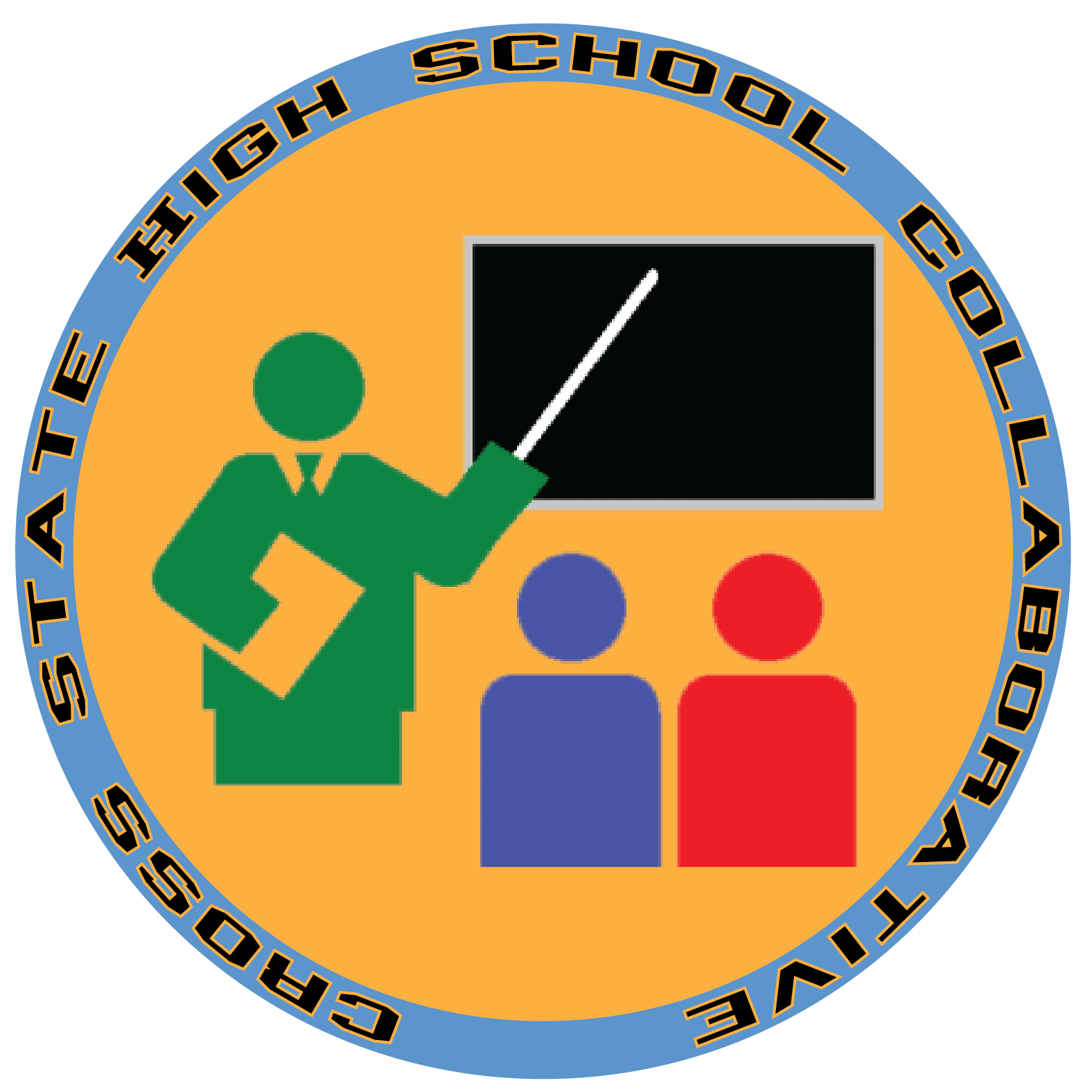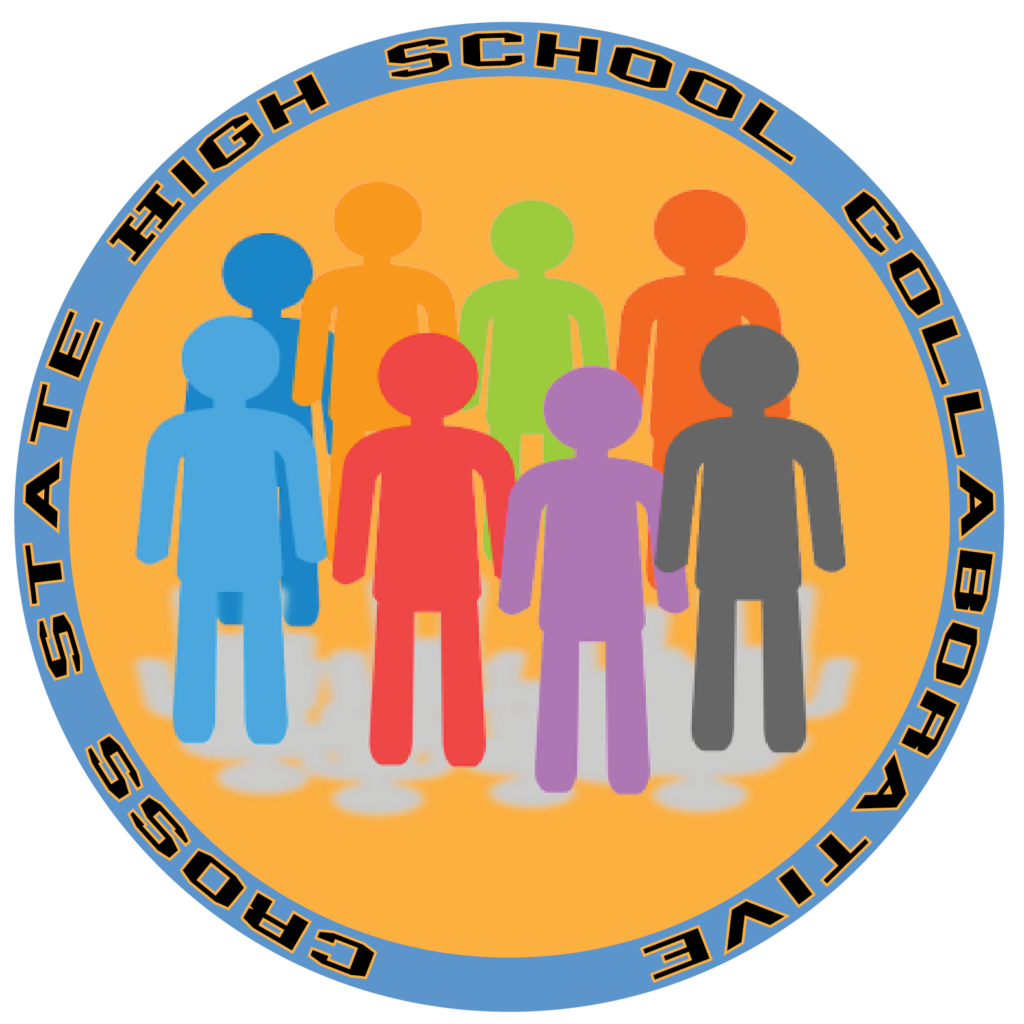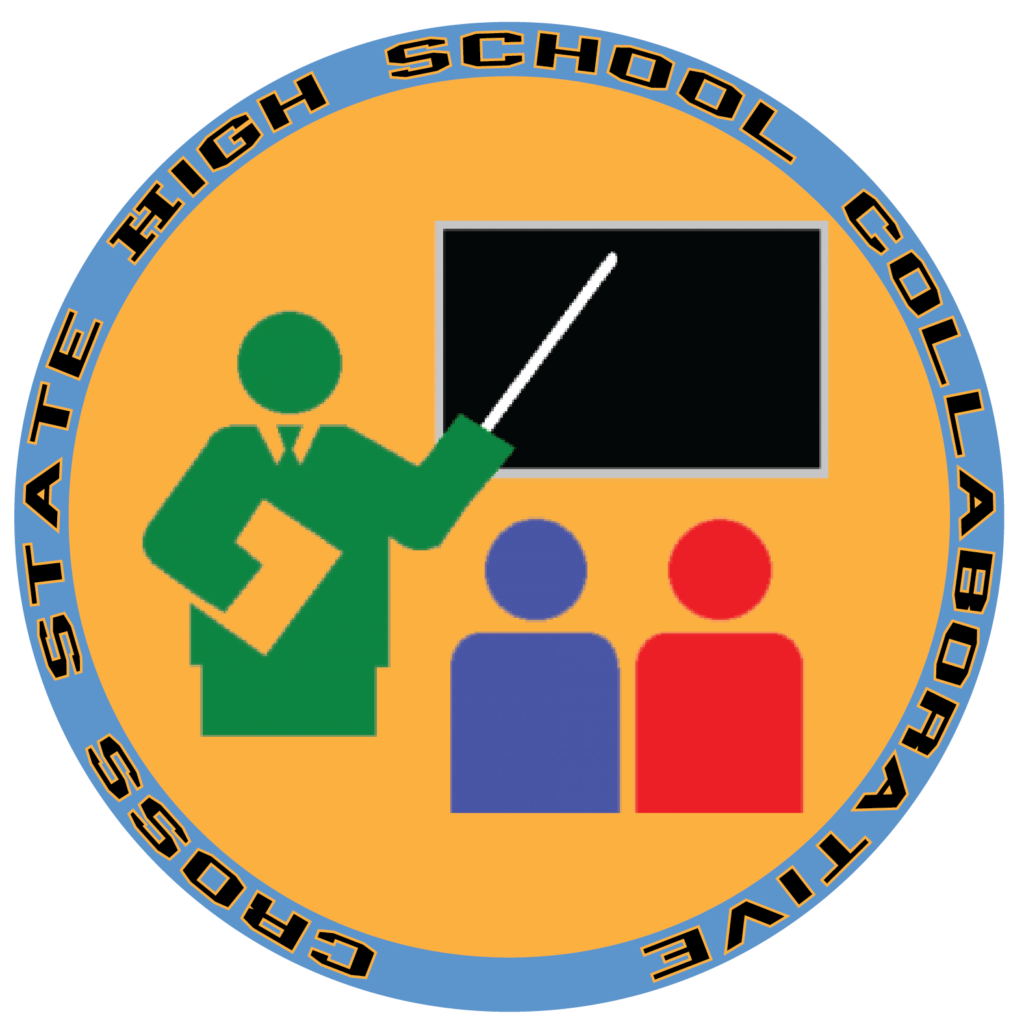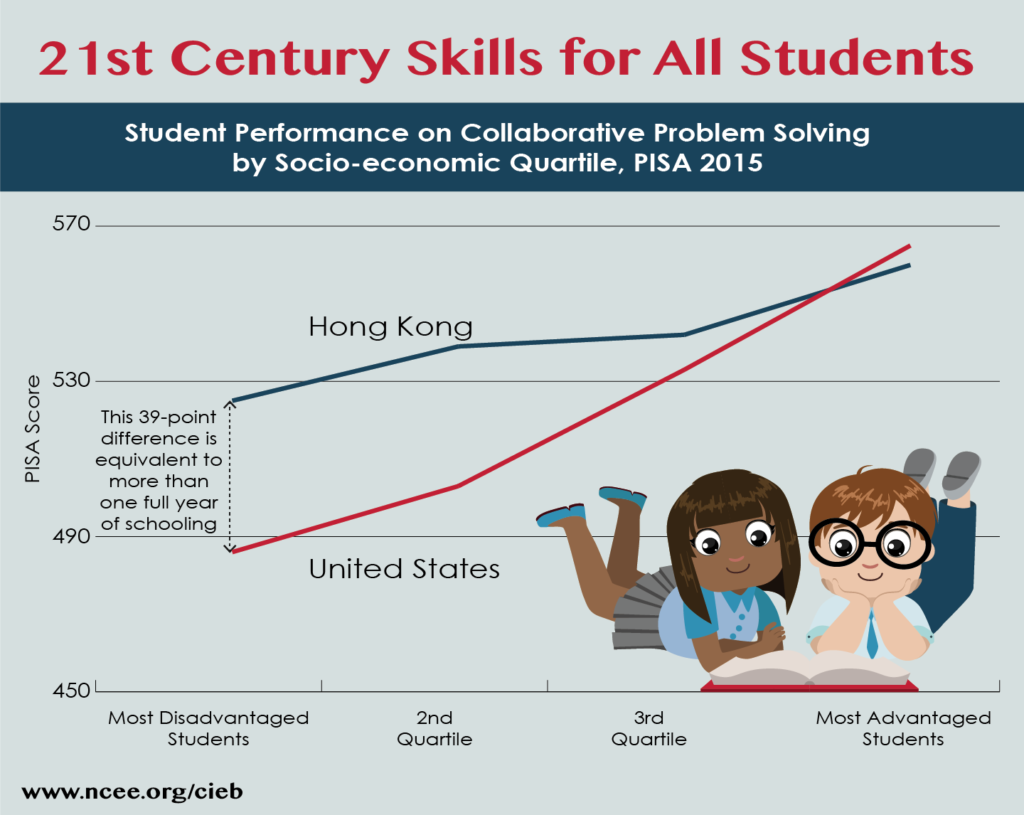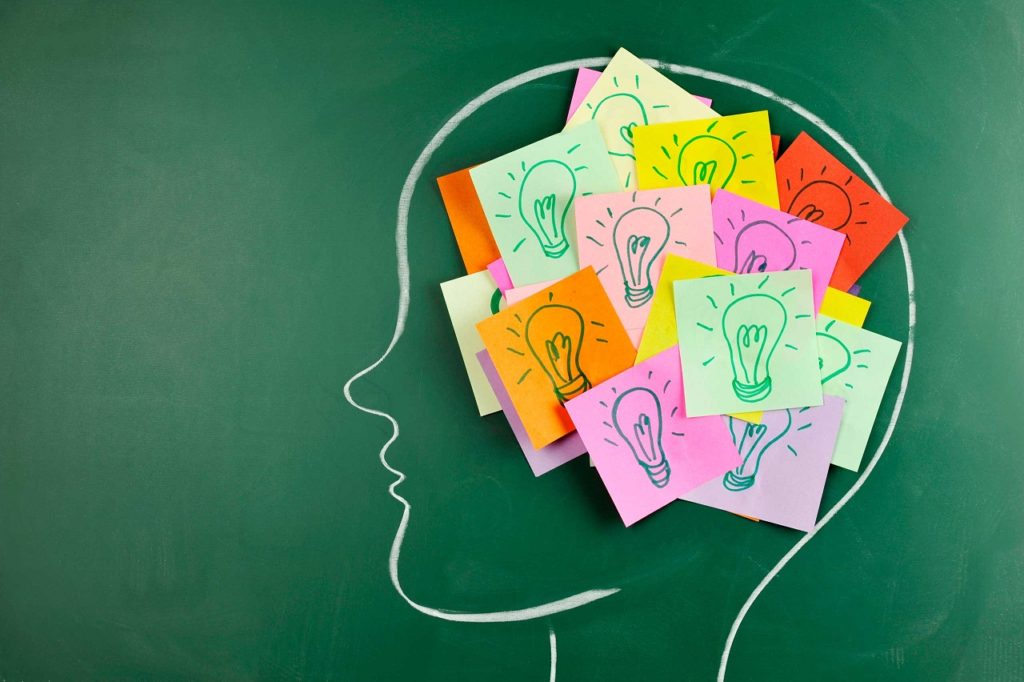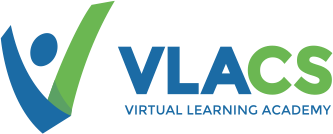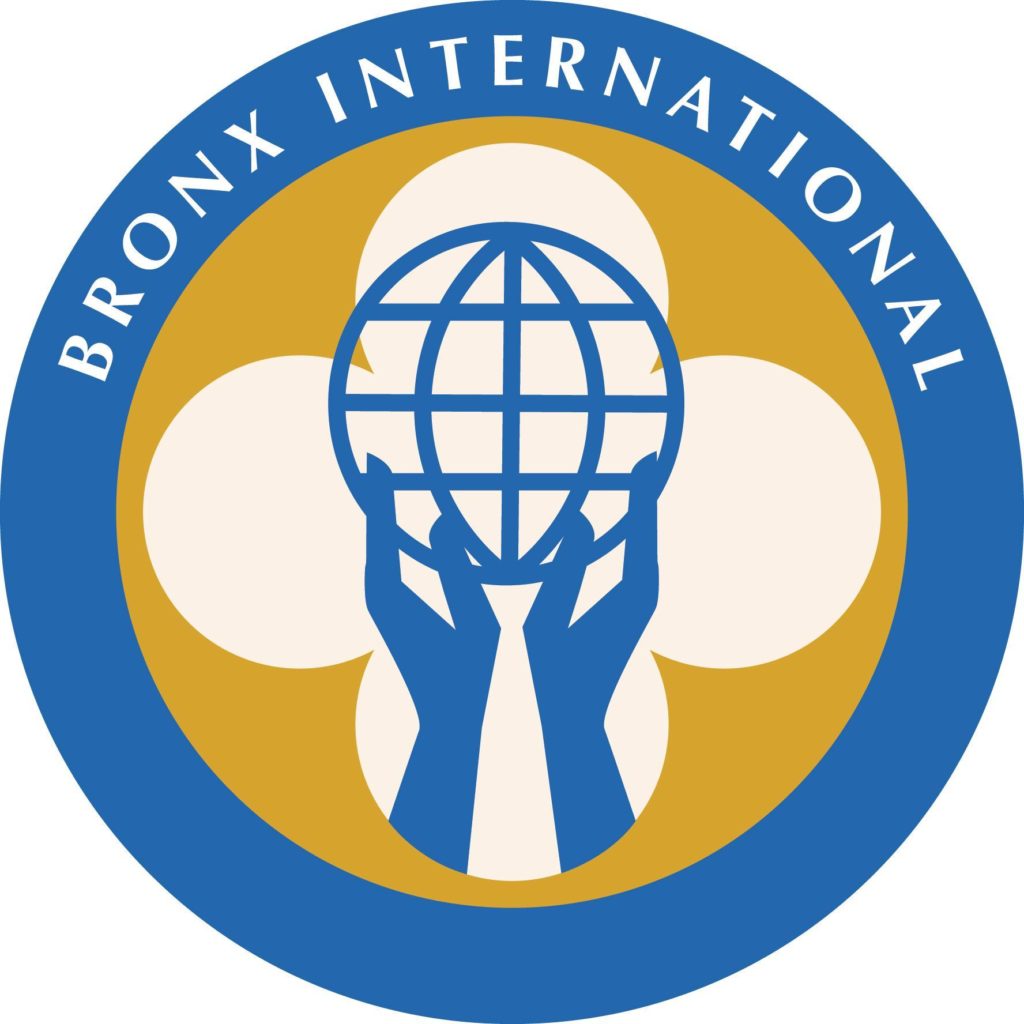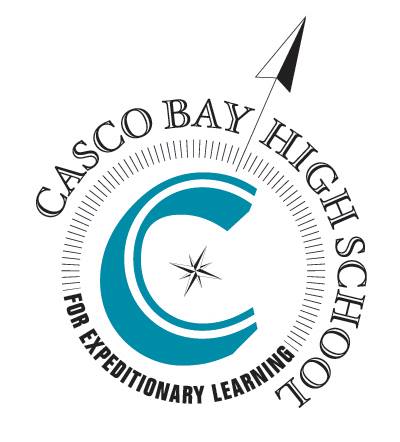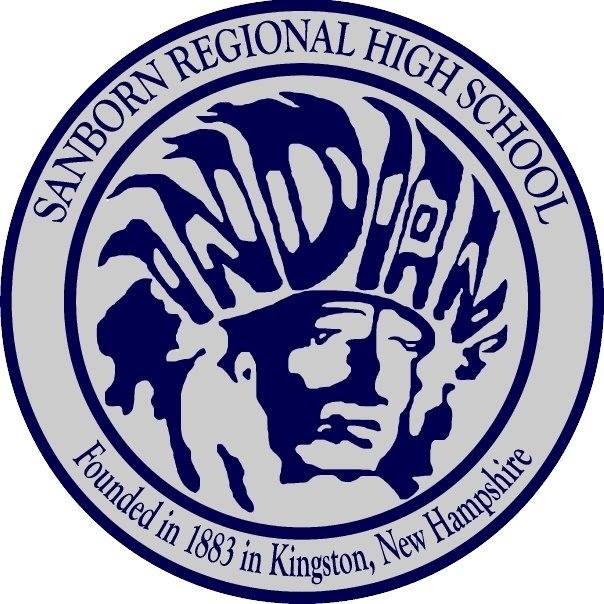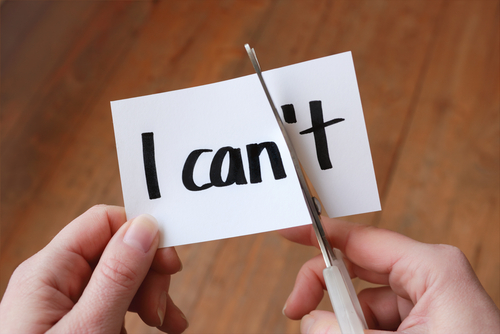Teaching & Learning
The resources are organized into seven key domains: Creating Challenging & Caring Classrooms; Using the Learning Sciences;PLCs and Instructional Coaching;Aligned Standards, Instruction, & Assessments;Using Formative Assessments to Tailor Instruction and Supports;Integrating Social, Emotional, and Academic Development; Developing Cultural Competencies
Building Community
Teacher Agency During Remote Learning
Teachers who have the agency to design remote learning that gives students hope and joy can find their own joy in teaching. Learn More
Designing for Equity
Schools as Communities of Care
Schools that operate as communities of care develop a sense of safety, a sense of belonging, a sense of joy, and a sense of hope in all of their students. They provide the foundation for students to truly thrive. Learn More
NEW–January, 2021
Implications for Educational Practice of the Science of Learning and Development
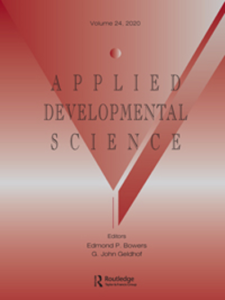 This article draws out the implications for school and classroom practices of an emerging consensus about the science of learning and development, outlined in a recent synthesis of the research. Situating the review in a developmental systems framework, we synthesize evidence from the learning sciences and several branches of educational research regarding well-vetted strategies that support the kinds of relationships and learning opportunities needed to promote children’s well-being, healthy development, and transferable learning. In addition, we review research regarding practices that can help educators respond to individual variability, address adversity, and support resilience, such that schools can enable all children to find positive pathways to adulthood. Click to Download (PDF)
This article draws out the implications for school and classroom practices of an emerging consensus about the science of learning and development, outlined in a recent synthesis of the research. Situating the review in a developmental systems framework, we synthesize evidence from the learning sciences and several branches of educational research regarding well-vetted strategies that support the kinds of relationships and learning opportunities needed to promote children’s well-being, healthy development, and transferable learning. In addition, we review research regarding practices that can help educators respond to individual variability, address adversity, and support resilience, such that schools can enable all children to find positive pathways to adulthood. Click to Download (PDF)
Click here to view the article online with additioinal references & data.
Click to learn more. . .
- Implement Evidence-Based Practices
- Creating Challenging & Caring Classrooms
- Using the Learning Sciences
- PLCs and Instructional Coaching
- Aligned Standards, Instruction, & Assessments
- Using Formative Assessments to Tailor Instruction and Supports
- Integrating Social, Emotional, and Academic Development
- Developing Cultural Competencies
Featured Resources for COVID-19

Resources For Teaching and Learning During This Period of Social Distancing this article examines the mindshifts to help educators, administrators, and parents better navigate the pitfalls of making the quick jump to online learning. It curates useful tools and resources with a view to maintain the indispensable human touch of teaching and learning during this period of social distancing. Read the Article.
Virtual Portfolio Defense Toolkit A guide to desgining authentic culminating assessment in the virtual space. Download the Toolkit (PDF) Get more information on Envision Learning Partners Webinar series at https://envisionlearning.org/virtual-defenses/
What the Evidence Says
Each of the seven domains described above may require substantial changes in teacher practice and preparation. As such, it is important to give considerable thought on how best to stage and sequence these actions and build the necessary teacher, leader, and student capacities in supportive and achievable manners.
Featured Resource
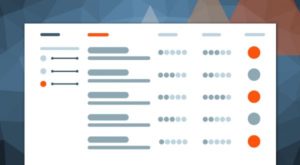 Evidence-Based Teaching & Learning Toolkits, offered through the Education Ednowment Foundation, these toolkits offer teachers the ‘best bets’ of what has worked most effectively to boost the attainment of disadvantaged students. Click for more information and to download the toolkits.
Evidence-Based Teaching & Learning Toolkits, offered through the Education Ednowment Foundation, these toolkits offer teachers the ‘best bets’ of what has worked most effectively to boost the attainment of disadvantaged students. Click for more information and to download the toolkits.
Creating Challenging & Caring Classrooms
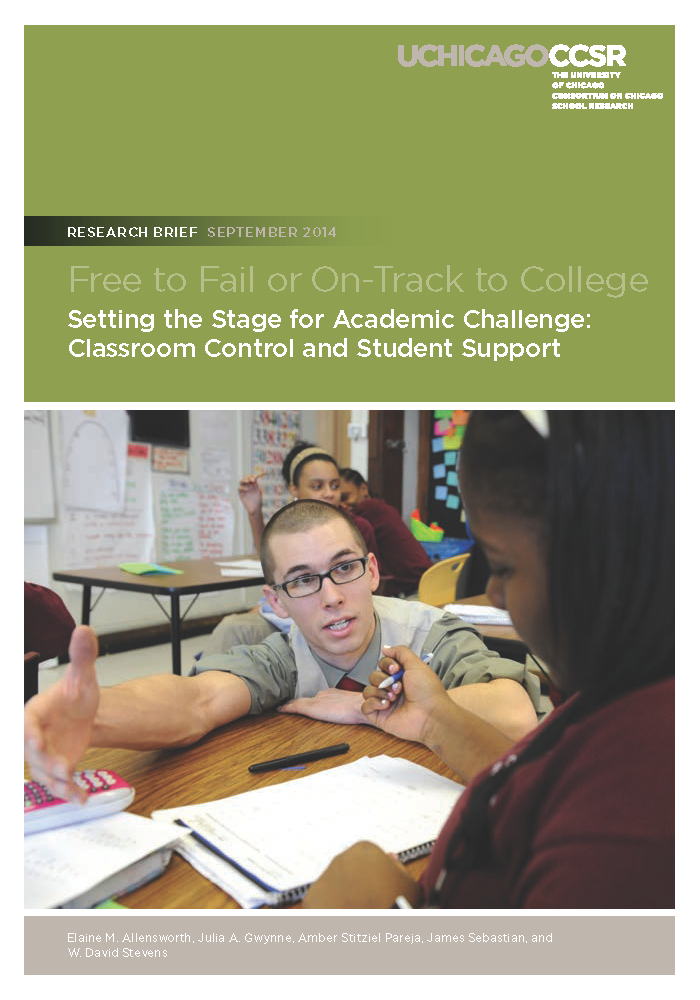 Free to Fail or On-track to College these studies suggest that increasing the challenge (rigor) of high school curriculum is unlikely to improve student achievement without concurrent improvements in teachers’ abilities around classroom management and academic support; asking students to do more challenging work can have both beneficial and adverse effects, depending on elements of the classroom instructional environment.
Free to Fail or On-track to College these studies suggest that increasing the challenge (rigor) of high school curriculum is unlikely to improve student achievement without concurrent improvements in teachers’ abilities around classroom management and academic support; asking students to do more challenging work can have both beneficial and adverse effects, depending on elements of the classroom instructional environment.
![]() ***NEW***SEPTEMBER, 2020***
***NEW***SEPTEMBER, 2020***
BetterLesson and PBLWorks Professional Learning at LUSD Lindsay Unified School District (LUSD) implemented a partnership with The Learning Accelerator (TLA) and software vendor Yet Analytics to examine the relationships between a variety of learning facilitator (LUSD’s preferred term for educators) and leader professional learning offerings and learner outcomes. This work is funded by a federal Teacher and School Leader (TSL) Grant. This research brief examines learning facilitators’ participation in two professional learning opportunities offered in partnership with external providers BetterLesson and PBLWorks in Grant Year 1 (2017-2018) and Grant Year 2 (2018-2019). Download the Report (PDF)
![]() Intergenerational Bonding in School: The Behavioral and Contextual Correlates of Student-Teacher Relationships explore the significance of social integration in the educational system, this study examined whether student-teacher relationships predicted two important student behavioral outcomes (academic achievement and disciplinary problems) Download the Report (PDF)
Intergenerational Bonding in School: The Behavioral and Contextual Correlates of Student-Teacher Relationships explore the significance of social integration in the educational system, this study examined whether student-teacher relationships predicted two important student behavioral outcomes (academic achievement and disciplinary problems) Download the Report (PDF)
 What Matters for Staying On-Track and Graduation in Chicago Public High Schools a report prepared by CCSR which looks closely at students’ performance in their coursework during their freshman year, how it is related to eventual graduation, and how personal and school factors contribute to success or failure in freshman-year courses.
What Matters for Staying On-Track and Graduation in Chicago Public High Schools a report prepared by CCSR which looks closely at students’ performance in their coursework during their freshman year, how it is related to eventual graduation, and how personal and school factors contribute to success or failure in freshman-year courses.
Project-Based Learning A Literature Review The concept of project-based learning (PBL) has garnered wide support among a number of K-12 education policy advocates and funders. This working paper published by MDRC builds on and updates a seminal literature review of PBL published in 2000.
![]() Why do students get good grades, or bad ones? The influence of the teacher, class, school, and student from the University of Chicago Consortium on School Research that addresses three key question:
Why do students get good grades, or bad ones? The influence of the teacher, class, school, and student from the University of Chicago Consortium on School Research that addresses three key question:
- To what extent do students receive different grades based on: a) Their teacher for a particular class? b) The school the student attends? c) The student’s background characteristics? d) Specific conditions of the class?
- How much of the variation in grades by teacher, school, student background, and class conditions can be attributed to students’ academic skills and efforts, as measured by test scores and attendance?
- What are the factors that account for systematic differences in grades across classes, teachers, and schools?
***New***January, 2021***
 Evidence-Based Teaching & Learning Toolkits, offered through the Education Ednowment Foundation, these toolkits offer teachers the ‘best bets’ of what has worked most effectively to boost the attainment of disadvantaged students. Click for more information and to download the toolkits.
Evidence-Based Teaching & Learning Toolkits, offered through the Education Ednowment Foundation, these toolkits offer teachers the ‘best bets’ of what has worked most effectively to boost the attainment of disadvantaged students. Click for more information and to download the toolkits.
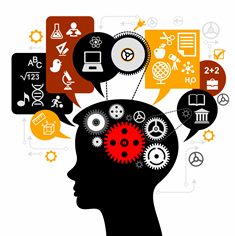 The 10 Biggest Breakthroughs in the Science of Learning, originally published by OnlinePHDPrograms.com, shares the 10 most significant breakthroughs that recent research has made on the science of learning, providing valuable insights on how to make the best use of your brain without wasting energy.
The 10 Biggest Breakthroughs in the Science of Learning, originally published by OnlinePHDPrograms.com, shares the 10 most significant breakthroughs that recent research has made on the science of learning, providing valuable insights on how to make the best use of your brain without wasting energy.
![]() Improving Students’ Learning With Effective Learning Techniques: Promising Directions From Cognitive and Educational Psychology improving educational outcomes will require efforts on many fronts, but a central premise of this monograph is that one part of a solution involves helping students to better regulate their learning through the use of effective learning techniques. Produced by the Association for Psychological Science.
Improving Students’ Learning With Effective Learning Techniques: Promising Directions From Cognitive and Educational Psychology improving educational outcomes will require efforts on many fronts, but a central premise of this monograph is that one part of a solution involves helping students to better regulate their learning through the use of effective learning techniques. Produced by the Association for Psychological Science.
Learning and Memory Under Stress: Implications for the Classroom Research over the past two decades identified stress and the hormones and neurotransmitters released during and after a stressful event as major modulators of human learning and memory processes, with critical implications for educational contexts. Taking these insights from psychology and neuroscience into account could bear the potential to facilitate processes of education for both students and teachers. Published by the Nature Partner Journals in partnership with the University of Queensland.
PLC’s and Instructional Coaching (content, instructional moves, classroom environment and behavior)
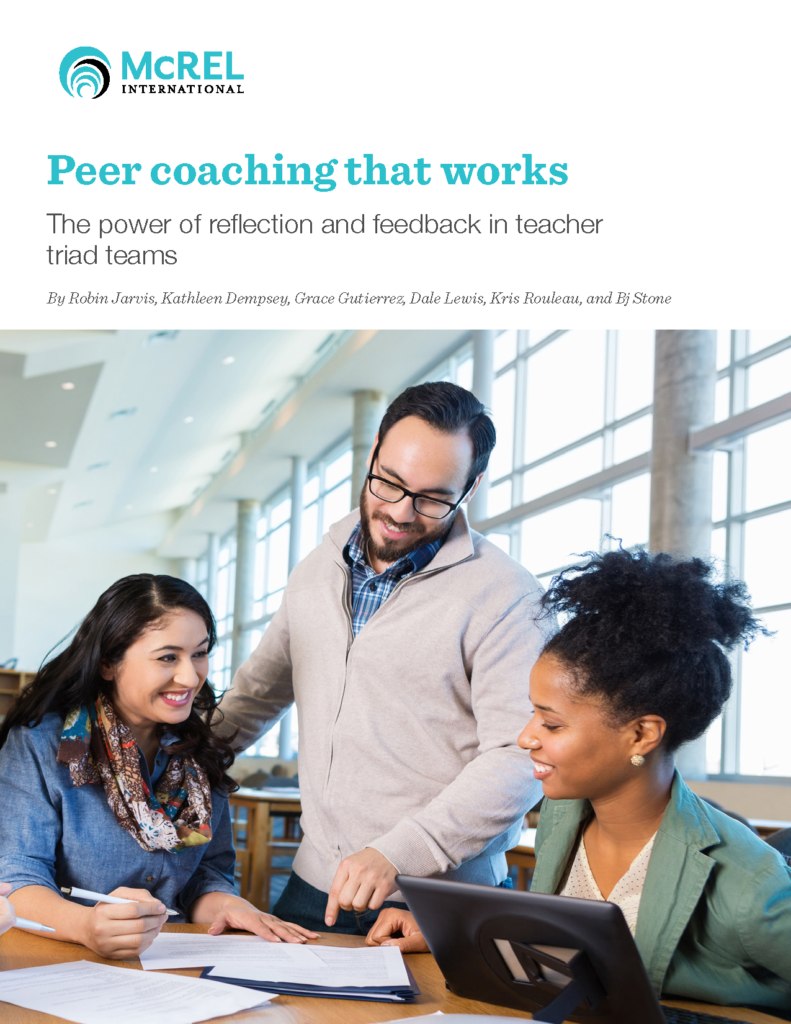 Peer Coaching that Works: The Power of Reflection and Feedback in Teacher Triad Teams this report from McRel Internationalexamines that teachers, like all professionals, should continuously grow and learn by developing new knowledge, skills, and abilities that benefit their students academically, we do not believe that a deficit-based approach to coaching is the way to get there.
Peer Coaching that Works: The Power of Reflection and Feedback in Teacher Triad Teams this report from McRel Internationalexamines that teachers, like all professionals, should continuously grow and learn by developing new knowledge, skills, and abilities that benefit their students academically, we do not believe that a deficit-based approach to coaching is the way to get there.
![]() The Effects of Coaching on English Teachers’ Reading Instruction Practices and Adolescent Students’ Reading Comprehension this report published in April, 2018 examines that although the use of literacy coaches is becoming more common, few research studies have shown positive effects of coaching on teacher practices and student achievement. In the current study, a cluster randomized design was used to evaluate usefulness of coaches for teachers of struggling high school students. High schools were randomly assigned across three experimental conditions: professional development workshops, workshops with written lesson materials, and workshops with lesson materials and coaching. Participants in this three-year study included 130 ninth-grade teachers and 3,160 ninth grade students. Recommended literacy practices included teacher modeling, student team discussions, and self-selected reading. Findings indicated that coaching improved teachers’ use and quality of recommended literacy practices and increased student reading achievement over the period of a year.
The Effects of Coaching on English Teachers’ Reading Instruction Practices and Adolescent Students’ Reading Comprehension this report published in April, 2018 examines that although the use of literacy coaches is becoming more common, few research studies have shown positive effects of coaching on teacher practices and student achievement. In the current study, a cluster randomized design was used to evaluate usefulness of coaches for teachers of struggling high school students. High schools were randomly assigned across three experimental conditions: professional development workshops, workshops with written lesson materials, and workshops with lesson materials and coaching. Participants in this three-year study included 130 ninth-grade teachers and 3,160 ninth grade students. Recommended literacy practices included teacher modeling, student team discussions, and self-selected reading. Findings indicated that coaching improved teachers’ use and quality of recommended literacy practices and increased student reading achievement over the period of a year.
Effective Teacher Professional Development A 2017 research brief from the Learning Policy Institute reporting on teacher professional learning is of increasing interest as one way to support the increasingly complex skills students need to succeed in the 21st century.
Aligned Standards, Instruction, & Assessments
![]() The Surprisingly Powerful Influence of Drawing on Memory is a report that explores whether drawing to-be-learned information enhanced memory and found it to be a reliable, replicable means of boosting performance.
The Surprisingly Powerful Influence of Drawing on Memory is a report that explores whether drawing to-be-learned information enhanced memory and found it to be a reliable, replicable means of boosting performance.
![]() If They Think, “I can”: Teacher bias and youth of color expectations and achievement this article examines one key social actor that plays a prominent role in the formation of student expectations and academic achievement is the classroom teacher. Scholars argue that teacher support, in the form of beliefs about students’ academic abilities, is crucial.
If They Think, “I can”: Teacher bias and youth of color expectations and achievement this article examines one key social actor that plays a prominent role in the formation of student expectations and academic achievement is the classroom teacher. Scholars argue that teacher support, in the form of beliefs about students’ academic abilities, is crucial.
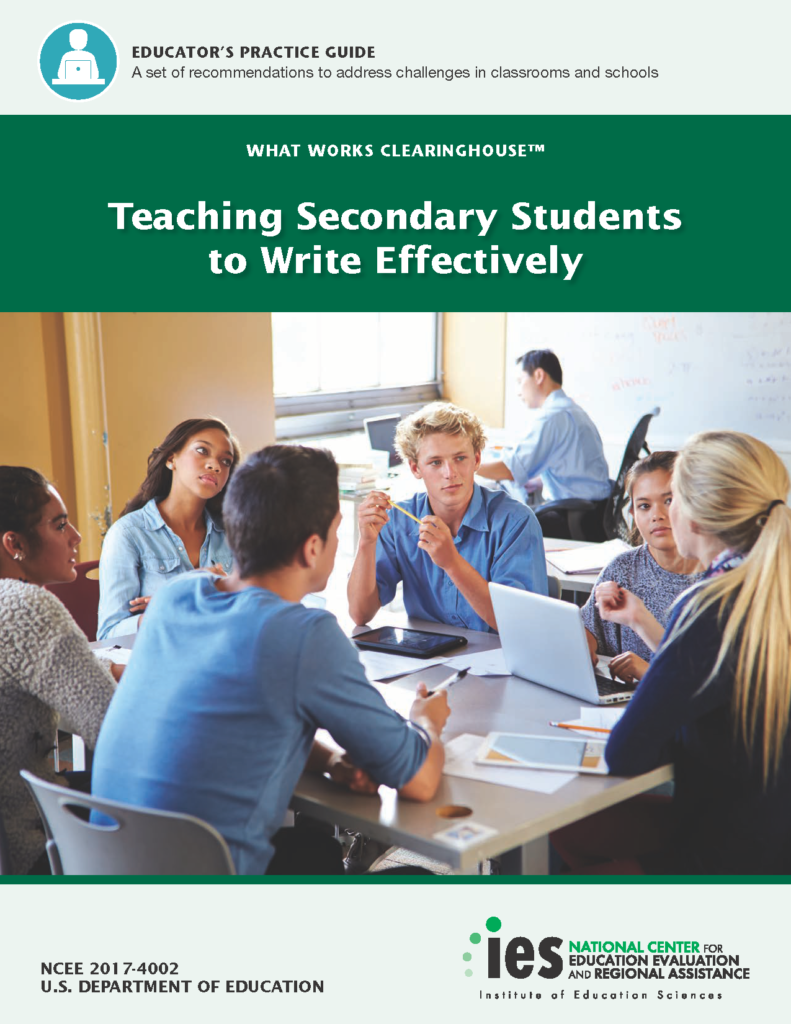 Teaching Secondary Students to Write Effectively from the Institute of Education Sciences offers educators specific, evidence-based recommendations that address the challenges of teaching students in grades 6–12 to write effectively. This guide synthesizes the best publicly available research and shares practices that are supported by evi-dence. It is intended to be practical and easy for teachers to use.
Teaching Secondary Students to Write Effectively from the Institute of Education Sciences offers educators specific, evidence-based recommendations that address the challenges of teaching students in grades 6–12 to write effectively. This guide synthesizes the best publicly available research and shares practices that are supported by evi-dence. It is intended to be practical and easy for teachers to use.
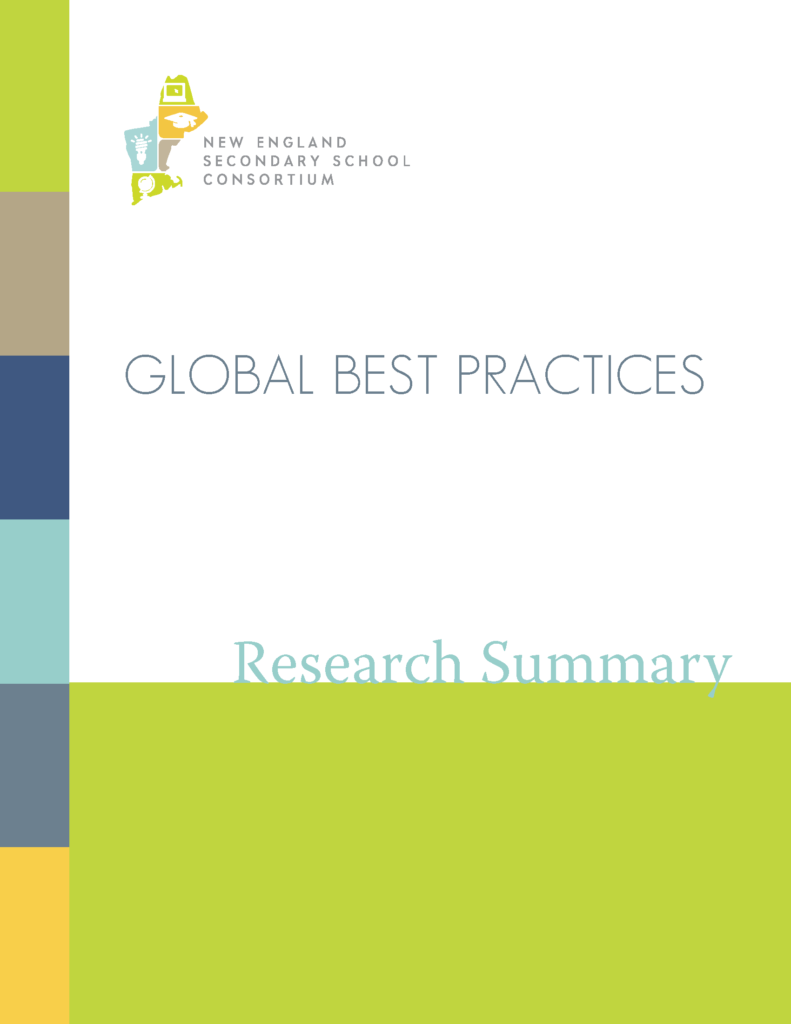 Global Best Practices: An Internationally Benchmarked Self-Assessment Tool for Secondary Learning was created by the New England Secondary School Consortium to equip high schools with a clearly articulated, step-by-step process they can follow to identify existing issues or needs, and to shape school-improvement plans and priorities.
Global Best Practices: An Internationally Benchmarked Self-Assessment Tool for Secondary Learning was created by the New England Secondary School Consortium to equip high schools with a clearly articulated, step-by-step process they can follow to identify existing issues or needs, and to shape school-improvement plans and priorities.
Download the Report Summary (PDF)
Download the Web-based Version
Using Formative Assessments to Tailor Instruction and Supports
![]() Using Data and Formative Assessment to Drive Instruction from Research for Better Teaching Empowering Sustainable School Improvement.
Using Data and Formative Assessment to Drive Instruction from Research for Better Teaching Empowering Sustainable School Improvement.
The Students in Front of US: Reform for the Current Generation of Urban High School Students Jefferson County Public Schools high school educators implemented Project Proficiency (PP). Results from state-administered mathematics tests demonstrated that all participating schools reported substantial increases in student proficiency. We examined the impact of PP on the performance of students, who met dropout predictive criteria established by Balfanz, Herzog, and MacIver. Study results suggested that PP students at risk of dropout realized meaningful and statistically significant achievement gains.
Integrating Social, Emotional, and Academic Development
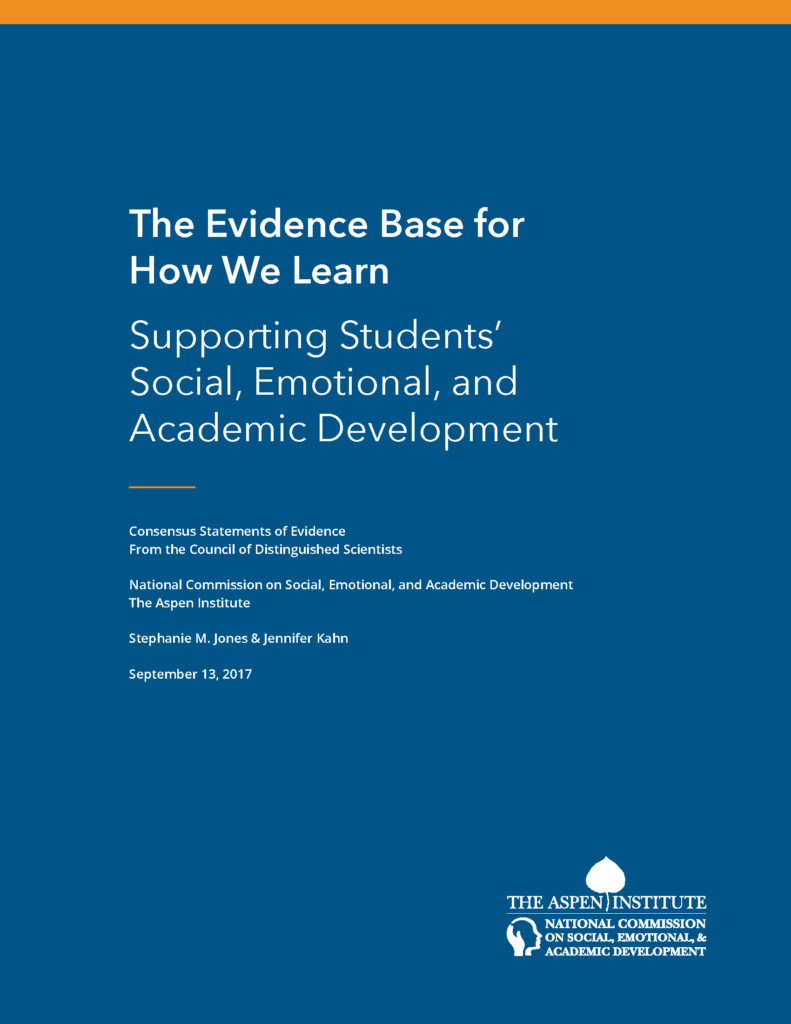 The Evidence Base for How We Learn Supporting Students’ Social, Emotional, and Academic Development by the National Commission on Social, Emotional, and Academic Development The Aspen Institute. A 20 page report that shows compelling research demonstrates what parents have always known—the success of young people in school and beyond is inextricably linked to healthy social and emotional development.
The Evidence Base for How We Learn Supporting Students’ Social, Emotional, and Academic Development by the National Commission on Social, Emotional, and Academic Development The Aspen Institute. A 20 page report that shows compelling research demonstrates what parents have always known—the success of young people in school and beyond is inextricably linked to healthy social and emotional development.
Download the Report (PDF)
Read the Full Report Online (PDF)
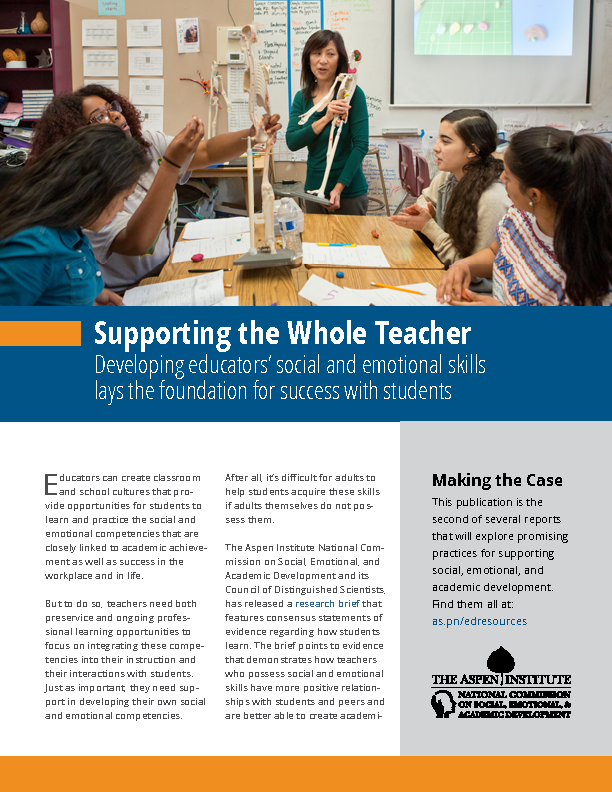 Supporting the Whole Teacher from The Aspen Institute highlights the need for teacher preparation and professional learning to both build teachers’ own social and emotional competence and prepare teachers to foster these skills in their students. The case study cites key examples of programs supporting teachers in this work including RULER, an evidence-based program that trains teachers on how to model the social and emotional behaviors they want to see in their students, and the Center for Reaching and Teaching the Whole Child, which works with teacher preparation programs to help integrate teacher and student social and emotional competencies into their classes.
Supporting the Whole Teacher from The Aspen Institute highlights the need for teacher preparation and professional learning to both build teachers’ own social and emotional competence and prepare teachers to foster these skills in their students. The case study cites key examples of programs supporting teachers in this work including RULER, an evidence-based program that trains teachers on how to model the social and emotional behaviors they want to see in their students, and the Center for Reaching and Teaching the Whole Child, which works with teacher preparation programs to help integrate teacher and student social and emotional competencies into their classes.
![]() Science of Learning and Development: A Synthesis human development derives from the continuous interaction between the individual and the context of each individual’s relationships and experiences. Development is shaped by a convergence of individual, biological, contextual, cultural, and historical factors.
Science of Learning and Development: A Synthesis human development derives from the continuous interaction between the individual and the context of each individual’s relationships and experiences. Development is shaped by a convergence of individual, biological, contextual, cultural, and historical factors.
![]() What Do Test Scores Miss? The Importance of Teacher Effects on Non-Test Score Outcomes issued by Northwestern University Institute for Policy Research. The paper extends the traditional test-score value-added model of teacher quality to allow for the possibility that teachers affect a variety of student outcomes through their effects on both students’ cognitive and noncognitive skill.
What Do Test Scores Miss? The Importance of Teacher Effects on Non-Test Score Outcomes issued by Northwestern University Institute for Policy Research. The paper extends the traditional test-score value-added model of teacher quality to allow for the possibility that teachers affect a variety of student outcomes through their effects on both students’ cognitive and noncognitive skill.
![]() Social-Emotional Learning Programs for Adolescents by David S. Yeager and The Future of Children poses the questions, do SEL programs work for adolescents? If so, how well and under what conditions? And how can they be improved? The article reviews these questions and SEL programs that try to help adolescents cope with their difficulties more successfully by improving skills and mindsets, and they try to create respectful school environments that young people want to be a part of by changing the school’s climate.
Social-Emotional Learning Programs for Adolescents by David S. Yeager and The Future of Children poses the questions, do SEL programs work for adolescents? If so, how well and under what conditions? And how can they be improved? The article reviews these questions and SEL programs that try to help adolescents cope with their difficulties more successfully by improving skills and mindsets, and they try to create respectful school environments that young people want to be a part of by changing the school’s climate.
WWC Intervention Report: My Teaching Partner–Secondary by the Institute of Education Sciences is a professional development program that aims to increase student learning and development through improved teacher–student interactions.
Developing Cultural Competencies
![]() Science of Learning and Development: A Synthesis human development derives from the continuous interaction between the individual and the context of each individual’s relationships and experiences. Development is shaped by a convergence of individual, biological, contextual, cultural, and historical factors.
Science of Learning and Development: A Synthesis human development derives from the continuous interaction between the individual and the context of each individual’s relationships and experiences. Development is shaped by a convergence of individual, biological, contextual, cultural, and historical factors.
![]() Rehumanizing the “Other”: Race, Culture, and Identity in Education Research in this excerpt from Review of Research in Education March 2016, Vol. 40, the authors examine the trajectory of the literature on race, culture, and identity in education research through the past century. The authors also explore the body of education research—from the mid 20th century to today—focused on the relationship between cultural and racial identities and students’ experiences with schooling. They close with a vision for the next era of research on this critical topic.
Rehumanizing the “Other”: Race, Culture, and Identity in Education Research in this excerpt from Review of Research in Education March 2016, Vol. 40, the authors examine the trajectory of the literature on race, culture, and identity in education research through the past century. The authors also explore the body of education research—from the mid 20th century to today—focused on the relationship between cultural and racial identities and students’ experiences with schooling. They close with a vision for the next era of research on this critical topic.
Supporting English Learners and Students with Disabilities strategies From Turnaround Schools in Massachusetts.
Implement Evidence-Based Practices
Here we introduce models and approaches to support implementation of selected practices at your school or your district.
Implementing evidence-based practices is a human endeavor and an ongoing process. It requires continuous self-reflection on the ways we teach and on the use of students’ work as indicators to determine the success of meeting the needs of diverse learners.
The resources in the section include concise articles, successful teaching and learning experiences as well as applications that may be used by practitioners as reference to build up teaching, bring together evidence of effective teaching approaches while leveraging resourcefulness and proven classroom strategies and techniques to improve students and teachers’ learning. In addition, this section highlights proof points of learning as demonstrated by schools implementing specific practices or strategies.
21st Century Skills for All Students the most socio-economically advantaged students in the United States and in Hong Kong performed at about the same level on collaborative problem solving skills on PISA 2015. Read more. . .
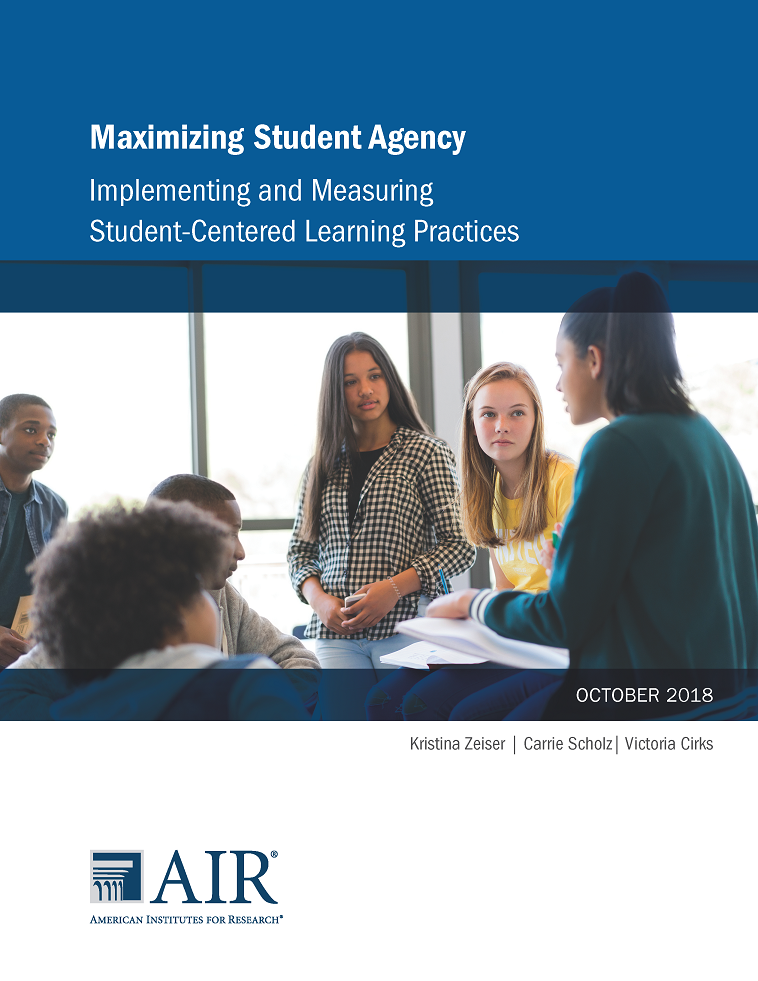 American Institute for Research worked with four New Tech Network (NTN) high schools in three states for the 2018 study Maximizing Student Agency: Implementing and Measuring Student-Centered Learning Practices to determine which teacher practices help or hinder the development of student agency, and whether these practices are effective across educational contexts and with different student subgroups.
American Institute for Research worked with four New Tech Network (NTN) high schools in three states for the 2018 study Maximizing Student Agency: Implementing and Measuring Student-Centered Learning Practices to determine which teacher practices help or hinder the development of student agency, and whether these practices are effective across educational contexts and with different student subgroups.
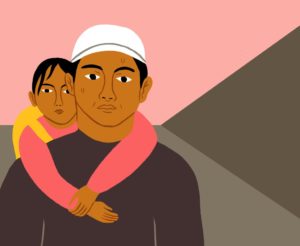 Over 2,000 students participated in the New York Times’ second annual December challenge to “connect what you’re learning in school with the world today,” and, as you’ll see from the work of the winners, this year’s best were just as insightful and imaginative as last year’s.
Over 2,000 students participated in the New York Times’ second annual December challenge to “connect what you’re learning in school with the world today,” and, as you’ll see from the work of the winners, this year’s best were just as insightful and imaginative as last year’s.
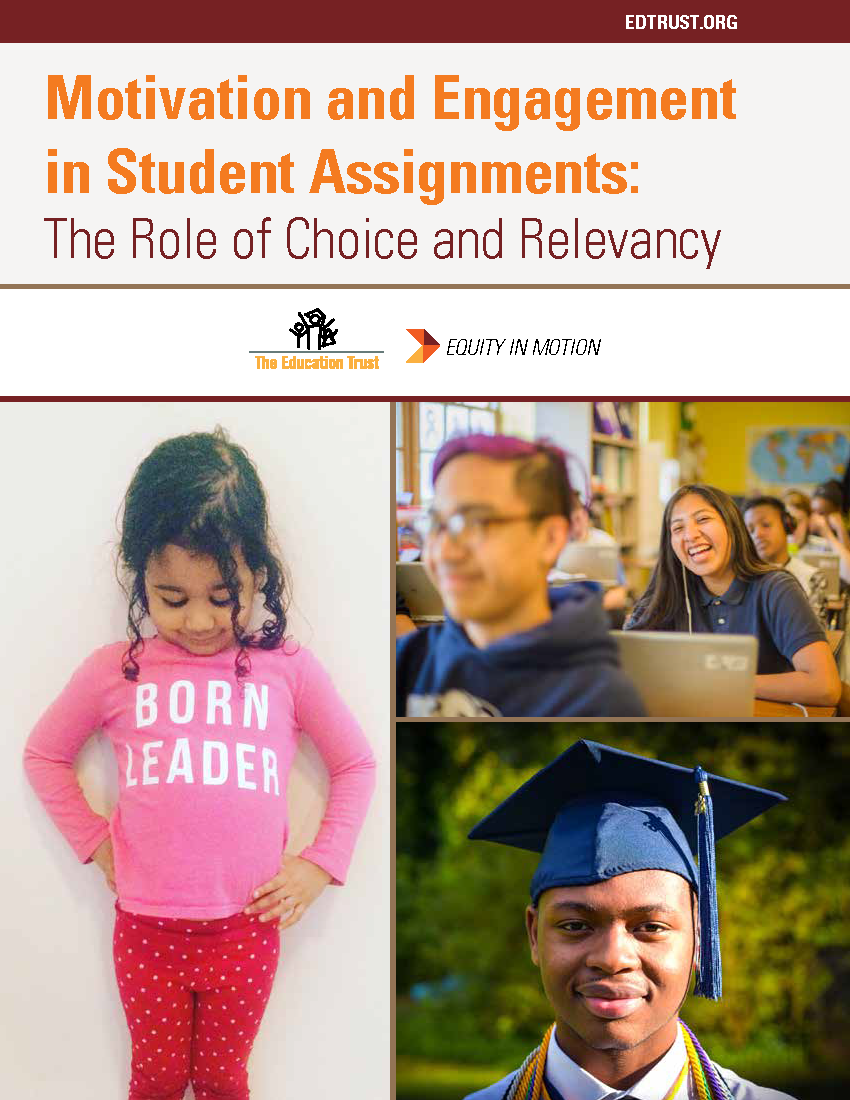 Motivation and Engagement in Student Assignments for students to thrive and achieve at high levels, they must be interested and emotionally invested in their learning. Why? Because motivation, or the desire that propels one to do something, leads to engagement, where students are being attentive to their tasks, putting forth positive effort, persisting through challenges, and advancing their ideas and understandings with a sense of intention.
Motivation and Engagement in Student Assignments for students to thrive and achieve at high levels, they must be interested and emotionally invested in their learning. Why? Because motivation, or the desire that propels one to do something, leads to engagement, where students are being attentive to their tasks, putting forth positive effort, persisting through challenges, and advancing their ideas and understandings with a sense of intention.
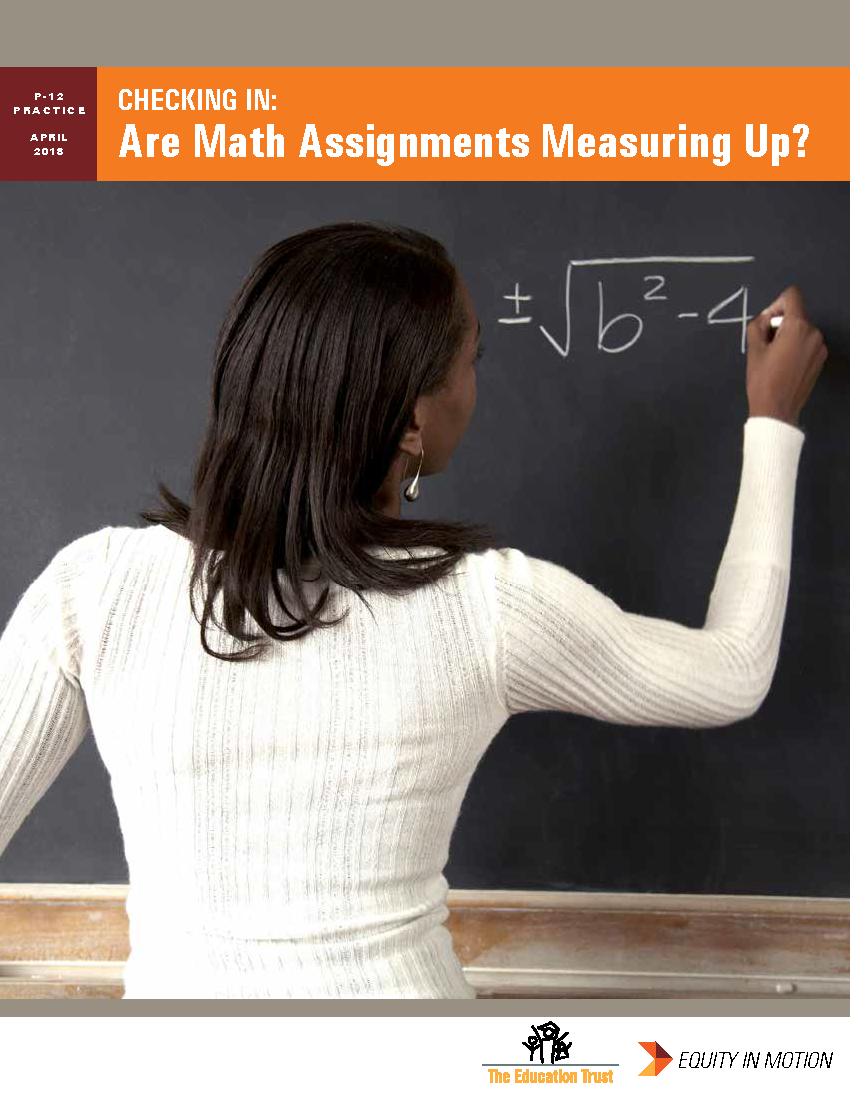 Are Math Assignments Measuring Up? Students can do no better than the assignments they’re given. That simple idea has been a driving force for The Education Trust’s practice work since its inception in the 1990s. And it animates a new generation of that work today, which involves analyzing classroom assignments in the context of more rigorous common standards and calling teachers to action. This kind of painstaking analysis of the daily academic experiences of students provides hugely important insights into what teachers know and understand about college- and career-ready standards — and what those teachers believe students
Are Math Assignments Measuring Up? Students can do no better than the assignments they’re given. That simple idea has been a driving force for The Education Trust’s practice work since its inception in the 1990s. And it animates a new generation of that work today, which involves analyzing classroom assignments in the context of more rigorous common standards and calling teachers to action. This kind of painstaking analysis of the daily academic experiences of students provides hugely important insights into what teachers know and understand about college- and career-ready standards — and what those teachers believe students
can do independently as a result of their teaching.
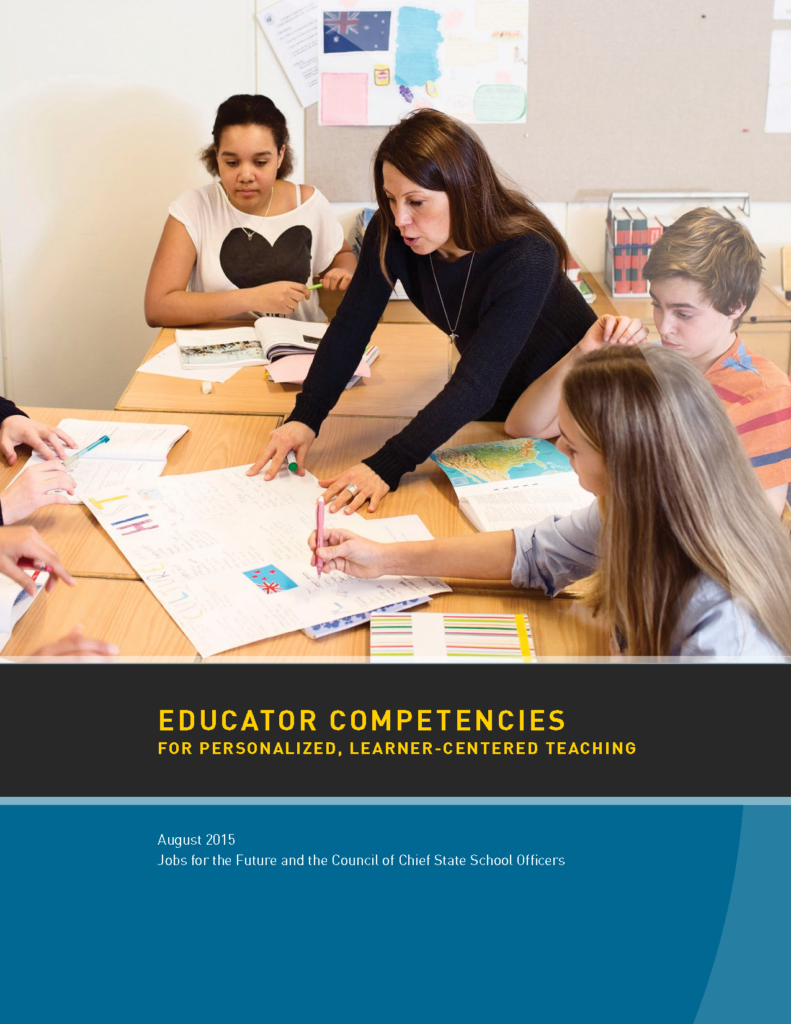 Educator Competencies for Personalized, Learner-Centered Teaching the development of Educator Competencies for Personalized, Learner-Centered Teaching serves as a first step in identifying the knowledge, skills, and dispositions that educators need in order to create and thrive in effective personalized, learner-centered environments.
Educator Competencies for Personalized, Learner-Centered Teaching the development of Educator Competencies for Personalized, Learner-Centered Teaching serves as a first step in identifying the knowledge, skills, and dispositions that educators need in order to create and thrive in effective personalized, learner-centered environments.
 Teacher Views and Voices the Center on Education Policy (CEP), in an effort to gather and amplify teachers’ voices about current education issues and their own profession, conducted a national survey of public school K-12 teachers in the winter of 2015-16. The survey focused on a strategic set of issues for policy-makers, educators, business leaders, and the public, including teachers’ views on their profession, standards, testing, and evaluations.
Teacher Views and Voices the Center on Education Policy (CEP), in an effort to gather and amplify teachers’ voices about current education issues and their own profession, conducted a national survey of public school K-12 teachers in the winter of 2015-16. The survey focused on a strategic set of issues for policy-makers, educators, business leaders, and the public, including teachers’ views on their profession, standards, testing, and evaluations.
 Supporting the Whole Teacher from The Aspen Institute highlights the need for teacher preparation and professional learning to both build teachers’ own social and emotional competence and prepare teachers to foster these skills in their students. The case study cites key examples of programs supporting teachers in this work including RULER, an evidence-based program that trains teachers on how to model the social and emotional behaviors they want to see in their students, and the Center for Reaching and Teaching the Whole Child, which works with teacher preparation programs to help integrate teacher and student social and emotional competencies into their classes.
Supporting the Whole Teacher from The Aspen Institute highlights the need for teacher preparation and professional learning to both build teachers’ own social and emotional competence and prepare teachers to foster these skills in their students. The case study cites key examples of programs supporting teachers in this work including RULER, an evidence-based program that trains teachers on how to model the social and emotional behaviors they want to see in their students, and the Center for Reaching and Teaching the Whole Child, which works with teacher preparation programs to help integrate teacher and student social and emotional competencies into their classes.
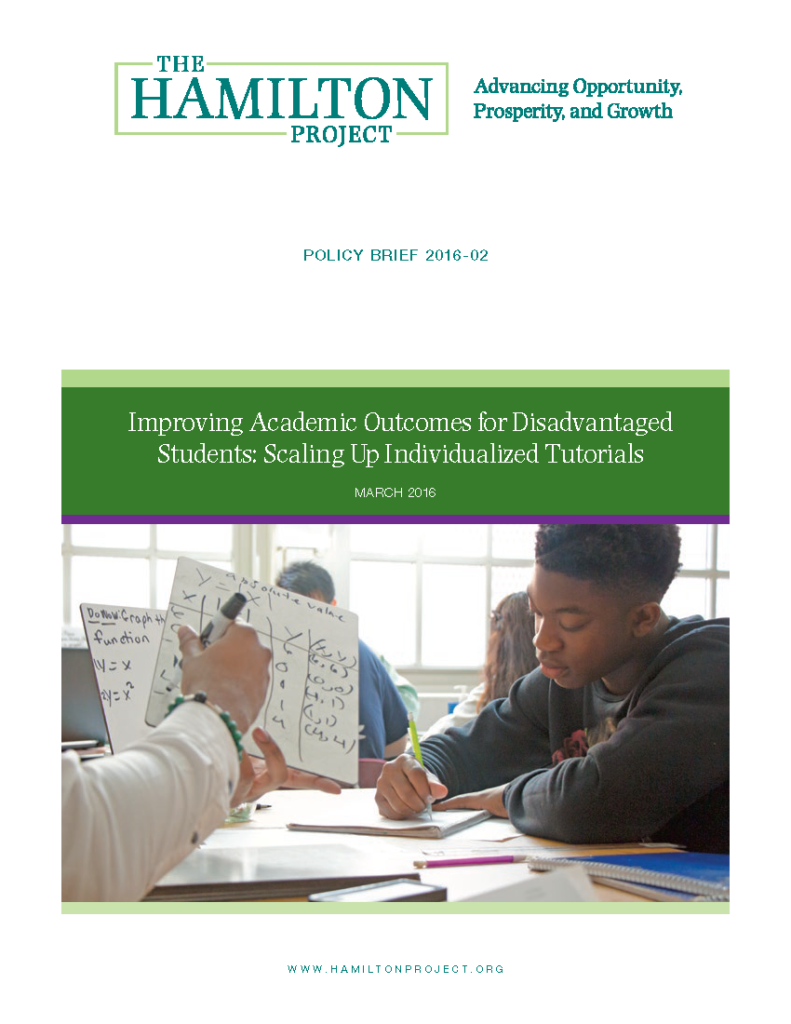 Improving Academic Outcomes for Disadvantaged Students: Scaling Up Individualized Tutorials prepared by The Hamilton Project examines the need for a more robust safety net for students who fall behind grade level is a key systemic challenge for many urban school districts.
Improving Academic Outcomes for Disadvantaged Students: Scaling Up Individualized Tutorials prepared by The Hamilton Project examines the need for a more robust safety net for students who fall behind grade level is a key systemic challenge for many urban school districts.
 Global Best Practices: An Internationally Benchmarked Self-Assessment Tool for Secondary Learning was created by the New England Secondary School Consortium to equip high schools with a clearly articulated, step-by-step process they can follow to identify existing issues or needs, and to shape school-improvement plans and priorities.
Global Best Practices: An Internationally Benchmarked Self-Assessment Tool for Secondary Learning was created by the New England Secondary School Consortium to equip high schools with a clearly articulated, step-by-step process they can follow to identify existing issues or needs, and to shape school-improvement plans and priorities.
Download the Research Summary (PDF)
Download the Web-based Version
![]() The Challenge of Culture Change: Embedding Restorative Practice in Schools this paper seeks to broaden the perspectives of senior and middle management and restorative practitioners around what restorative practice in schools can look like; and to present some practical guidelines which represent a strategic approach to the implementation of restorative practices, so that they “stick” – that is, become sustainable.
The Challenge of Culture Change: Embedding Restorative Practice in Schools this paper seeks to broaden the perspectives of senior and middle management and restorative practitioners around what restorative practice in schools can look like; and to present some practical guidelines which represent a strategic approach to the implementation of restorative practices, so that they “stick” – that is, become sustainable.
![]()
Video: XQ Super School PSI High
PSI High is an immersive, full-time program located within Seminole High School where students work in an environment that looks like a high-tech office instead of a classroom. Rather than learn through traditional instruction, our students join teams with their peers and teachers to solve real community, business,
and social problems.
The guide, Design Your Personal Learning Plan, from Problem Solving Incubator High School in Seminole County Public Schools provides an example for creating an individualized learning plan that combines face to face classroom experiences, individual advisors and project- based learning experiences across the school campus and community.
Download the Guide (PDF)
Video: Does Early College for HS Kids Boost Graduations?
A PBS’s NEWSHOUR feature that examines a South Texas high school that integrates early college learning into the high school curriculum in an a multi-cultural environment of poverty, English as second language, differing education levels, etc.
CLICK TO ENLARGE
See it in Action!
Blended Learning—An innovative blended learning program at Huntley High School is breaking down the barriers of the traditional school day and leveraging technology to help students learn better. Blended Learning classes at Huntley High School Inspire, Challenge and Empower students to become self-motivated learners through both face to face and online instruction. HHS utilizes a Flex Learning Model of Blended Learning.
As a national pioneer of this increasingly popular approach, the District has been recognized in a national peer-reviewed journal, CNN, Parenting Magazine, the Pearson Education Blog, and other media outlets.
Visit Huntly High School’s Website
See it in Action!
Competency-based Learning—Virtual Learning Academy (VLACS) is a New Hampshire online virtual public middle school and high school. VLACS offers students the opportunity to learn at their own pace, full or part time with 20,000 course enrollments. Visit VLACS’s Website
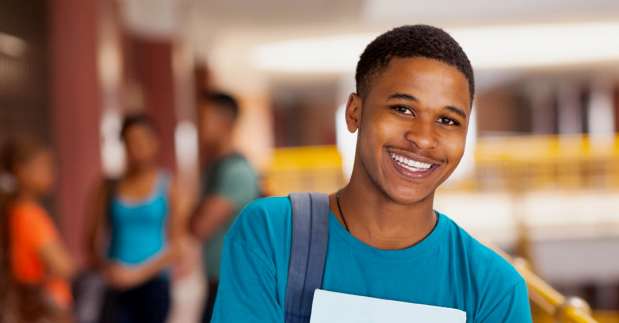 Some information about the program includes:
Some information about the program includes:
- Learn through courses, projects, internships, travel, etc.
- Registration is on-going. Students can start any time.
- Certified teachers work to establish positive relationships with every student.
- Complete a middle school program, earn a high school diploma, or an associate degree.
- Learn at a pace that meets the individual student’s needs.
- Students are welcome from any state or country.
- Any New Hampshire student can attend tuition-free!
- Offering full-time and part time opportunities for middle and high school students.
Podcast:
School Mission & Culture
Michele Cahill hosts a discussion with experts about how to build equity into 21st century learning environments. Featuring: Arva Rice President and CEO of the New York Urban League Sonja Santelises Vice President for K-12 Policy and Practice at the Education Trust Uri Treisman Professor of Mathematics and Director of the Charles A. Dana Center at the University of Texas, Austin.
Click to listen to the Podcast
See it in Action!
Bronx International High School is a progressive, team-based and community-based school dedicated to serving the academic and social needs of recently immigrated young people and their families. BIHS’s mission is to enhance students’ cultural awareness, English and native language proficiencies, and intellectual and collaborative abilities. These skills will empower them to become active participants in today’s interdependent and diverse world. By critically analyzing and responding to complex world issues, students will achieve academic, personal, and professional success, as they become advocates for themselves and their communities.
See it in Action!
Casco Bay High School for Expeditionary Learning (CBHS) is a small and rigorous public high school that reflects the increasing diversity of Portland, Maine. Founded in 2005, CBHS is a school of choice for just under 400 students. Casco Bay challenges and supports students to become college-ready through our 3Rs: Rigor, Relevance, and Relationships. 98% of our graduates have been accepted to college. In 2017, CBHS was again named one of Maine’s top high schools by US News and World Report. CBHS is a credentialed school in the EL Education national network of schools, and one of the original “Mentor Schools.” In fall 2014, CBHS was named one of 20 “Deeper Learning” schools in the country and won the $100,000 Larry O’Toole Award from the Nellie Mae Foundation for advancing student-centered learning in New England.
Podcast:
Technology & Learning
Michele Cahill hosts a conversation with experts on how to use technology as a learning asset. Featuring: Nichole Pinkard Professor at DePaul University and Founder of the Digital Youth Network Mary Ryerse Director of Strategic Design at Getting Smart Monica Martinez Former President of the New Tech Network and Co-Author of Deeper Learning.
See it in Action!
Sanborn Regional High School is a leader in competency-based learning. Located in New Hampshire, SRHS features flexible learning time to personalize instruction and provide students with support for intervention, extension and enrichment. Sanborn Regional High School is committed to sustaining a positive environment which promotes respect, academic excellence, and pride by encouraging independent thinking within a culture of collaboration.
Download SRHS’s Core Values & Beliefs and Learning Expectations (PDF)
Visit the SRHS’s Website
Sandborn Regional High School produced a nine-minute video focusing on Competency-Based Learning.
Featured Resource
If They Think, “I can”: Teacher bias and youth of color expectations and achievement this article examines one key social actor that plays a prominent role in the formation of student expectations and academic achievement is the classroom teacher. Scholars argue that teacher support, in the form of beliefs about students’ academic abilities, is crucial.

